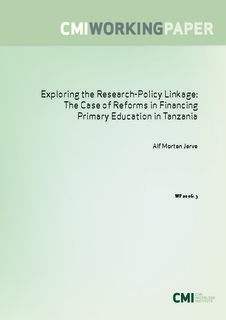| dc.contributor.author | Jerve, Alf Morten | |
| dc.date.accessioned | 2008-02-18T13:46:27Z | |
| dc.date.accessioned | 2017-03-29T09:12:50Z | |
| dc.date.available | 2008-02-18T13:46:27Z | |
| dc.date.available | 2017-03-29T09:12:50Z | |
| dc.date.issued | 2006 | |
| dc.identifier.isbn | 82-8062-139-3 | |
| dc.identifier.issn | 0804-3639 | |
| dc.identifier.uri | http://hdl.handle.net/11250/2435946 | |
| dc.description.abstract | Tanzania abolished school fees in primary schools as from 2002. This move was made possible because of shifts in the policy of major donors, not least the World Bank. In the subsequent years Tanzania recorded a rapid increase in enrolment rates. It is generally argued that fees in primary education turn away children from school, but researchers disagree on the relative importance of this effect.
In this paper we use this case of policy reform to study the role of research. Was this an example of evidence-based policy making? If so, where did the evidence come from? Our main focus was on the role of national researchers and findings from relevant research on Tanzania. The study shows that this research has had particular problems in becoming relevant and used, and identify the major factors that can explain its marginal role. | |
| dc.language.iso | eng | |
| dc.publisher | Chr. Michelsen Institute | |
| dc.relation.ispartofseries | CMI Working paper | |
| dc.relation.ispartofseries | WP 2006: 3 | |
| dc.subject | Education policy | |
| dc.subject | Development | |
| dc.subject | Role of research | |
| dc.subject | User fees | |
| dc.subject | Tanzania | |
| dc.title | Exploring the Research-Policy Linkage: The Case of Reforms in Financing Primary Education in Tanzania | |
| dc.type | Working paper | |
